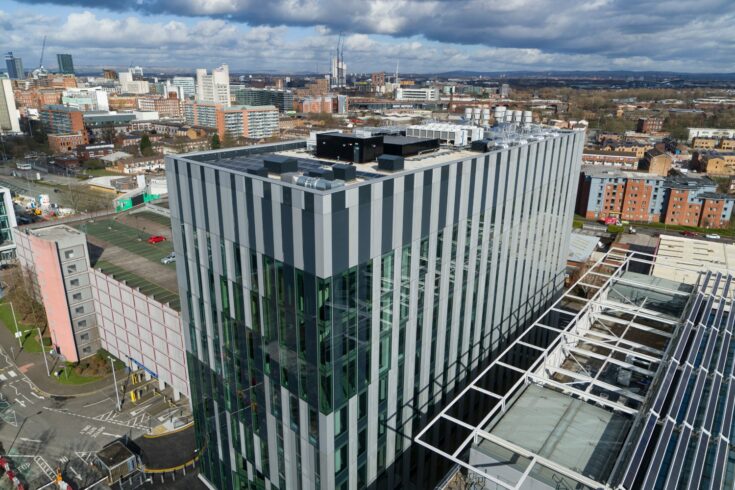The Henry Royce Institute for advanced materials research and innovation celebrated a key milestone earlier this year ahead of the new national hub becoming fully operational in 2021.
The Royce hub building based at The University of Manchester will draw together facilities and expertise from the institute’s partner organisations:
- National Nuclear Laboratory
- UK Atomic Energy Authority
- Imperial College London
- University of Cambridge
- University of Leeds
- University of Liverpool
- University of Oxford
- The University of Sheffield
as well as engaging widely with UK academics and industry.
World-class collaborative research
Extending across nine floors and located at the heart of The University of Manchester’s campus, it will foster world-class collaborative research in tandem with industry to act as an international convener for materials research excellence.
Following the construction phase, the state-of-the-art Royce hub building was handed over by the contractors Laing O’Rourke in March 2020. The first operational staff were just hours away from moving in before non-essential facilities closure was initiated in line with government guidance.
Progress on the interiors still continues and the institute can now share a first look inside the £105 million building which will act as a national hub for driving advanced materials research, development and commercialisation in the UK.
Contractors continue the fit-out to minimise disruption when equipment and staff move in following The University of Manchester’s phased reopening of the campus. The first labs are expected to be completed towards the end of 2020.
New equipment
The building will host £45 million worth of new equipment for:
- biomedical materials
- metals processing
- digital fabrication
- sustainable materials research.
Alongside this will be collaborative space for industry engagement, helping to accelerate the development and commercialisation of advanced materials for a sustainable society.
The building and equipment totalling £150 million forms part of the wider £235 million investment by the Engineering and Physical Sciences Research Council (EPSRC) across Royce’s national partnership. An investment of £500,000 has also been made by The Wolfson Foundation to support the biomedical materials facility within the building.
Centre of scientific excellence
Regius Professor of Materials and Royce Chief Scientist Philip Withers said:
The new Royce hub building will act as a centre of scientific excellence for advanced materials and a meeting place for the national community.
By bringing together the UK’s academic and industrial materials leaders, Royce will identify new opportunities, workshop ideas, and develop new strategies and approaches to tomorrow’s materials demands.
Professor David Knowles, CEO of the Henry Royce Institute said:
Royce has come a long way since its inception in 2016 and the handover of the new Royce hub building in Manchester represents the next chapter in our story.
Although COVID-19 has delivered some unprecedented challenges and delays, we are confident that the physical space will demonstrate that the national institute is truly open for business.
We can now look to address challenge-led research that will have positive impact on UK and global citizens, underpinning the Royce vision of ‘advanced materials for a sustainable society’.
Tackling global challenges
Professor Dame Lynn Gladden, EPSRC Executive Chair said:
Advanced materials research and innovation is essential to tackle global challenges from applications in the energy sector to advances in healthcare.
The opening of the new Royce hub building is an important milestone to drive exciting advanced materials research that will extend our capabilities across a wide range of disciplines.
Further information
The Royce hub building, under the project and cost management of Arcadis was designed by NBBJ, an international architectural practice, alongside civil and structural engineers Ramboll and building services engineers Arup.
The building was delivered by Laing O’Rourke, the appointed contractor by The University of Manchester.

